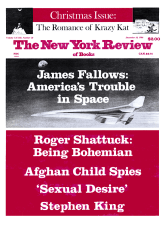In response to:
The War that Won't Go Away from the September 25, 1986 issue
To the Editors:
John Gregory Dunne’s discourse about Vietnam and Vietnam veterans [NYR, September 25] was interesting and enlightening, even though much of what he wrote is not new. One of the four books discussed in the review, Baskir and Strauss’ Chance and Circumstance, was published eight years ago.
Mr. Dunne’s article also contained one small but significant error. “Of the 1,200 men in the Harvard class of 1970,” he wrote, “only 56 served in the military, just two in Vietnam.” I presume he gleaned that information from the fifth anniversary report of the Harvard class of 1970, which contained the results of a survey on military service. Mr. Dunne evidently must not have realized that only about six hundred members of the class—less than half—responded to that survey.
It is true that sons of the middle and lower classes were overrepresented among US forces in Vietnam. But I take exception to his characterization of those who served as “a rainbow coalition of black, brown, and redneck.” Unlike Mr. Dunne, who only knows three people who served in Vietnam, I know dozens. Some are black, some are brown, but no vet I know would answer to the pejorative term “redneck.” I can see no useful purpose in Dunne joining the chorus of those who have demeaned Vietnam veterans.
Marc Leepson
Vietnam Veterans of America, Inc.
Washington, D.C.
John Gregory Dunne replies:
I hope Mr. Leepson is not implying that all, or even a large percentage, of the six hundred nonrespondents to Harvard 1970’s fifth reunion study served in Vietnam. When I checked the college’s department of alumni records, it had no figures on the number from that class who had actually done military service there. Those who did respond to Harvard 1970’s poll, however, were an extraordinarily large sample—nearly fifty percent of the class—and one can assume the percentages would have held, i.e., two Vietnam veterans out of the six hundred respondents. Allowing for polling error, this would mean a fraction of one percent if the entire class were counted, a figure “significant” only in its insignificance.
If Mr. Leepson took offense at the words “a rainbow coalition of black, brown, and redneck,” none was intended.
This Issue
December 18, 1986



